Accounting Theory and Application - Assignment
VerifiedAdded on 2021/05/31
|8
|2160
|31
AI Summary
Contribute Materials
Your contribution can guide someone’s learning journey. Share your
documents today.
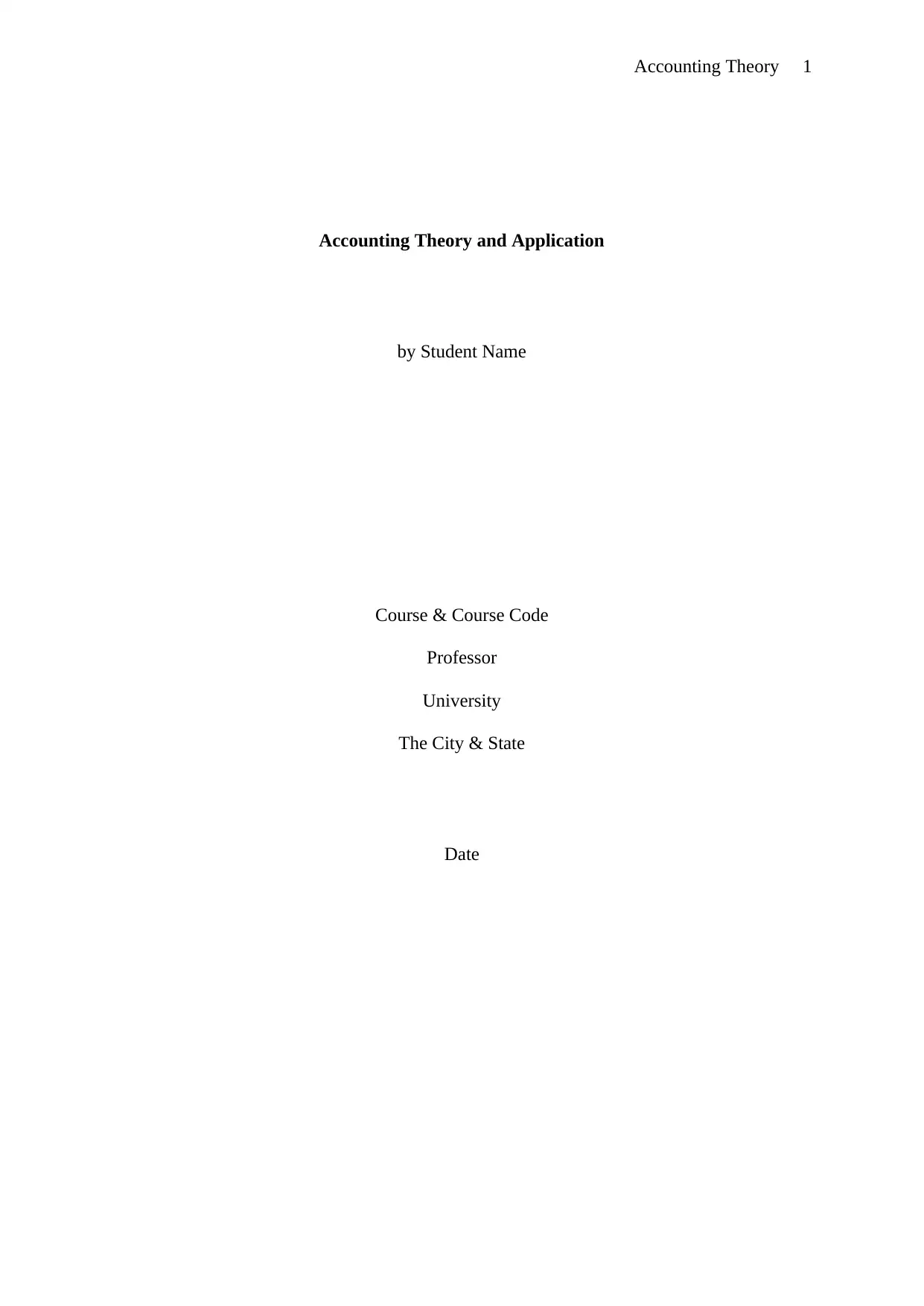
Accounting Theory 1
Accounting Theory and Application
by Student Name
Course & Course Code
Professor
University
The City & State
Date
Accounting Theory and Application
by Student Name
Course & Course Code
Professor
University
The City & State
Date
Secure Best Marks with AI Grader
Need help grading? Try our AI Grader for instant feedback on your assignments.
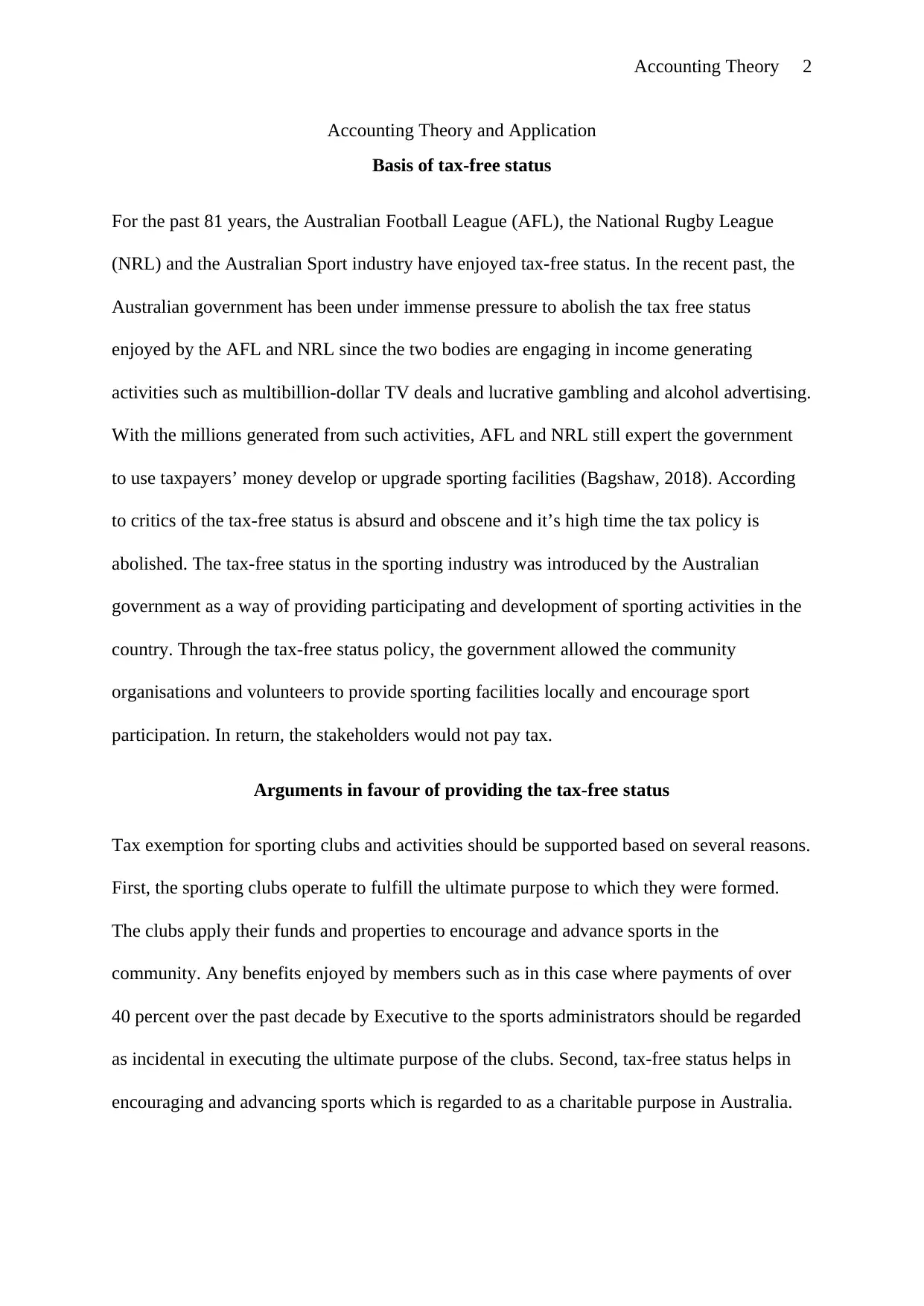
Accounting Theory 2
Accounting Theory and Application
Basis of tax-free status
For the past 81 years, the Australian Football League (AFL), the National Rugby League
(NRL) and the Australian Sport industry have enjoyed tax-free status. In the recent past, the
Australian government has been under immense pressure to abolish the tax free status
enjoyed by the AFL and NRL since the two bodies are engaging in income generating
activities such as multibillion-dollar TV deals and lucrative gambling and alcohol advertising.
With the millions generated from such activities, AFL and NRL still expert the government
to use taxpayers’ money develop or upgrade sporting facilities (Bagshaw, 2018). According
to critics of the tax-free status is absurd and obscene and it’s high time the tax policy is
abolished. The tax-free status in the sporting industry was introduced by the Australian
government as a way of providing participating and development of sporting activities in the
country. Through the tax-free status policy, the government allowed the community
organisations and volunteers to provide sporting facilities locally and encourage sport
participation. In return, the stakeholders would not pay tax.
Arguments in favour of providing the tax-free status
Tax exemption for sporting clubs and activities should be supported based on several reasons.
First, the sporting clubs operate to fulfill the ultimate purpose to which they were formed.
The clubs apply their funds and properties to encourage and advance sports in the
community. Any benefits enjoyed by members such as in this case where payments of over
40 percent over the past decade by Executive to the sports administrators should be regarded
as incidental in executing the ultimate purpose of the clubs. Second, tax-free status helps in
encouraging and advancing sports which is regarded to as a charitable purpose in Australia.
Accounting Theory and Application
Basis of tax-free status
For the past 81 years, the Australian Football League (AFL), the National Rugby League
(NRL) and the Australian Sport industry have enjoyed tax-free status. In the recent past, the
Australian government has been under immense pressure to abolish the tax free status
enjoyed by the AFL and NRL since the two bodies are engaging in income generating
activities such as multibillion-dollar TV deals and lucrative gambling and alcohol advertising.
With the millions generated from such activities, AFL and NRL still expert the government
to use taxpayers’ money develop or upgrade sporting facilities (Bagshaw, 2018). According
to critics of the tax-free status is absurd and obscene and it’s high time the tax policy is
abolished. The tax-free status in the sporting industry was introduced by the Australian
government as a way of providing participating and development of sporting activities in the
country. Through the tax-free status policy, the government allowed the community
organisations and volunteers to provide sporting facilities locally and encourage sport
participation. In return, the stakeholders would not pay tax.
Arguments in favour of providing the tax-free status
Tax exemption for sporting clubs and activities should be supported based on several reasons.
First, the sporting clubs operate to fulfill the ultimate purpose to which they were formed.
The clubs apply their funds and properties to encourage and advance sports in the
community. Any benefits enjoyed by members such as in this case where payments of over
40 percent over the past decade by Executive to the sports administrators should be regarded
as incidental in executing the ultimate purpose of the clubs. Second, tax-free status helps in
encouraging and advancing sports which is regarded to as a charitable purpose in Australia.
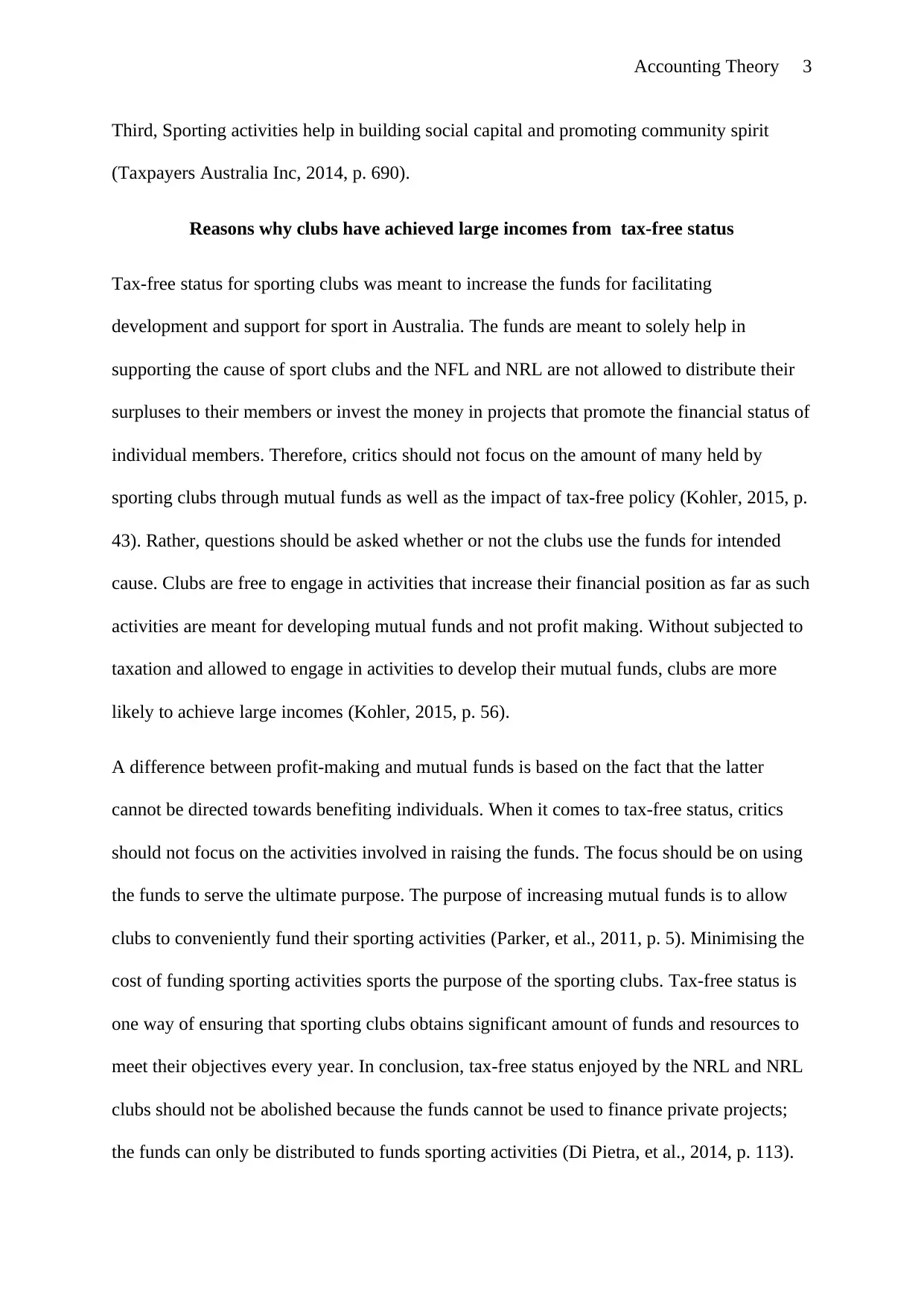
Accounting Theory 3
Third, Sporting activities help in building social capital and promoting community spirit
(Taxpayers Australia Inc, 2014, p. 690).
Reasons why clubs have achieved large incomes from tax-free status
Tax-free status for sporting clubs was meant to increase the funds for facilitating
development and support for sport in Australia. The funds are meant to solely help in
supporting the cause of sport clubs and the NFL and NRL are not allowed to distribute their
surpluses to their members or invest the money in projects that promote the financial status of
individual members. Therefore, critics should not focus on the amount of many held by
sporting clubs through mutual funds as well as the impact of tax-free policy (Kohler, 2015, p.
43). Rather, questions should be asked whether or not the clubs use the funds for intended
cause. Clubs are free to engage in activities that increase their financial position as far as such
activities are meant for developing mutual funds and not profit making. Without subjected to
taxation and allowed to engage in activities to develop their mutual funds, clubs are more
likely to achieve large incomes (Kohler, 2015, p. 56).
A difference between profit-making and mutual funds is based on the fact that the latter
cannot be directed towards benefiting individuals. When it comes to tax-free status, critics
should not focus on the activities involved in raising the funds. The focus should be on using
the funds to serve the ultimate purpose. The purpose of increasing mutual funds is to allow
clubs to conveniently fund their sporting activities (Parker, et al., 2011, p. 5). Minimising the
cost of funding sporting activities sports the purpose of the sporting clubs. Tax-free status is
one way of ensuring that sporting clubs obtains significant amount of funds and resources to
meet their objectives every year. In conclusion, tax-free status enjoyed by the NRL and NRL
clubs should not be abolished because the funds cannot be used to finance private projects;
the funds can only be distributed to funds sporting activities (Di Pietra, et al., 2014, p. 113).
Third, Sporting activities help in building social capital and promoting community spirit
(Taxpayers Australia Inc, 2014, p. 690).
Reasons why clubs have achieved large incomes from tax-free status
Tax-free status for sporting clubs was meant to increase the funds for facilitating
development and support for sport in Australia. The funds are meant to solely help in
supporting the cause of sport clubs and the NFL and NRL are not allowed to distribute their
surpluses to their members or invest the money in projects that promote the financial status of
individual members. Therefore, critics should not focus on the amount of many held by
sporting clubs through mutual funds as well as the impact of tax-free policy (Kohler, 2015, p.
43). Rather, questions should be asked whether or not the clubs use the funds for intended
cause. Clubs are free to engage in activities that increase their financial position as far as such
activities are meant for developing mutual funds and not profit making. Without subjected to
taxation and allowed to engage in activities to develop their mutual funds, clubs are more
likely to achieve large incomes (Kohler, 2015, p. 56).
A difference between profit-making and mutual funds is based on the fact that the latter
cannot be directed towards benefiting individuals. When it comes to tax-free status, critics
should not focus on the activities involved in raising the funds. The focus should be on using
the funds to serve the ultimate purpose. The purpose of increasing mutual funds is to allow
clubs to conveniently fund their sporting activities (Parker, et al., 2011, p. 5). Minimising the
cost of funding sporting activities sports the purpose of the sporting clubs. Tax-free status is
one way of ensuring that sporting clubs obtains significant amount of funds and resources to
meet their objectives every year. In conclusion, tax-free status enjoyed by the NRL and NRL
clubs should not be abolished because the funds cannot be used to finance private projects;
the funds can only be distributed to funds sporting activities (Di Pietra, et al., 2014, p. 113).
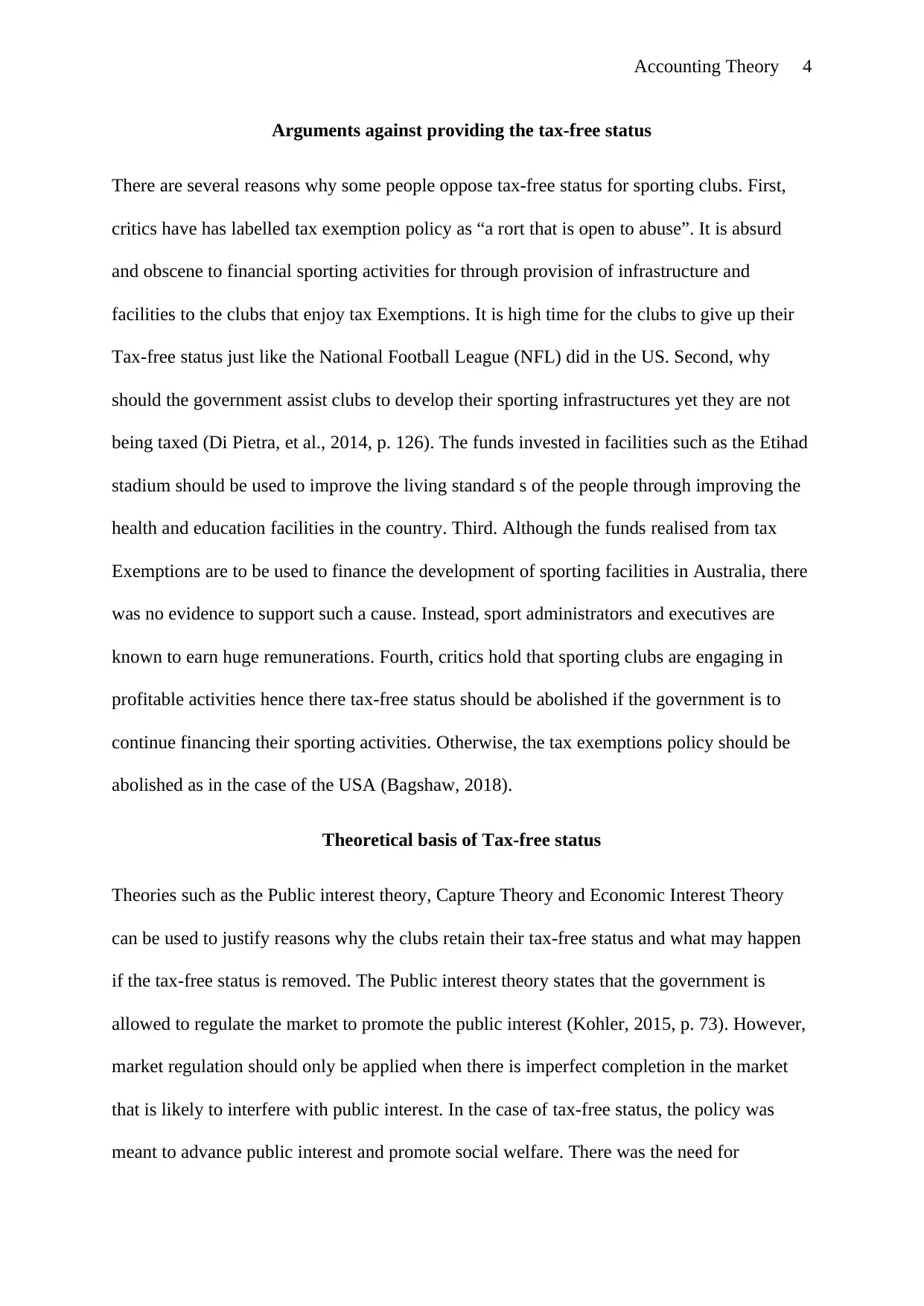
Accounting Theory 4
Arguments against providing the tax-free status
There are several reasons why some people oppose tax-free status for sporting clubs. First,
critics have has labelled tax exemption policy as “a rort that is open to abuse”. It is absurd
and obscene to financial sporting activities for through provision of infrastructure and
facilities to the clubs that enjoy tax Exemptions. It is high time for the clubs to give up their
Tax-free status just like the National Football League (NFL) did in the US. Second, why
should the government assist clubs to develop their sporting infrastructures yet they are not
being taxed (Di Pietra, et al., 2014, p. 126). The funds invested in facilities such as the Etihad
stadium should be used to improve the living standard s of the people through improving the
health and education facilities in the country. Third. Although the funds realised from tax
Exemptions are to be used to finance the development of sporting facilities in Australia, there
was no evidence to support such a cause. Instead, sport administrators and executives are
known to earn huge remunerations. Fourth, critics hold that sporting clubs are engaging in
profitable activities hence there tax-free status should be abolished if the government is to
continue financing their sporting activities. Otherwise, the tax exemptions policy should be
abolished as in the case of the USA (Bagshaw, 2018).
Theoretical basis of Tax-free status
Theories such as the Public interest theory, Capture Theory and Economic Interest Theory
can be used to justify reasons why the clubs retain their tax-free status and what may happen
if the tax-free status is removed. The Public interest theory states that the government is
allowed to regulate the market to promote the public interest (Kohler, 2015, p. 73). However,
market regulation should only be applied when there is imperfect completion in the market
that is likely to interfere with public interest. In the case of tax-free status, the policy was
meant to advance public interest and promote social welfare. There was the need for
Arguments against providing the tax-free status
There are several reasons why some people oppose tax-free status for sporting clubs. First,
critics have has labelled tax exemption policy as “a rort that is open to abuse”. It is absurd
and obscene to financial sporting activities for through provision of infrastructure and
facilities to the clubs that enjoy tax Exemptions. It is high time for the clubs to give up their
Tax-free status just like the National Football League (NFL) did in the US. Second, why
should the government assist clubs to develop their sporting infrastructures yet they are not
being taxed (Di Pietra, et al., 2014, p. 126). The funds invested in facilities such as the Etihad
stadium should be used to improve the living standard s of the people through improving the
health and education facilities in the country. Third. Although the funds realised from tax
Exemptions are to be used to finance the development of sporting facilities in Australia, there
was no evidence to support such a cause. Instead, sport administrators and executives are
known to earn huge remunerations. Fourth, critics hold that sporting clubs are engaging in
profitable activities hence there tax-free status should be abolished if the government is to
continue financing their sporting activities. Otherwise, the tax exemptions policy should be
abolished as in the case of the USA (Bagshaw, 2018).
Theoretical basis of Tax-free status
Theories such as the Public interest theory, Capture Theory and Economic Interest Theory
can be used to justify reasons why the clubs retain their tax-free status and what may happen
if the tax-free status is removed. The Public interest theory states that the government is
allowed to regulate the market to promote the public interest (Kohler, 2015, p. 73). However,
market regulation should only be applied when there is imperfect completion in the market
that is likely to interfere with public interest. In the case of tax-free status, the policy was
meant to advance public interest and promote social welfare. There was the need for
Secure Best Marks with AI Grader
Need help grading? Try our AI Grader for instant feedback on your assignments.
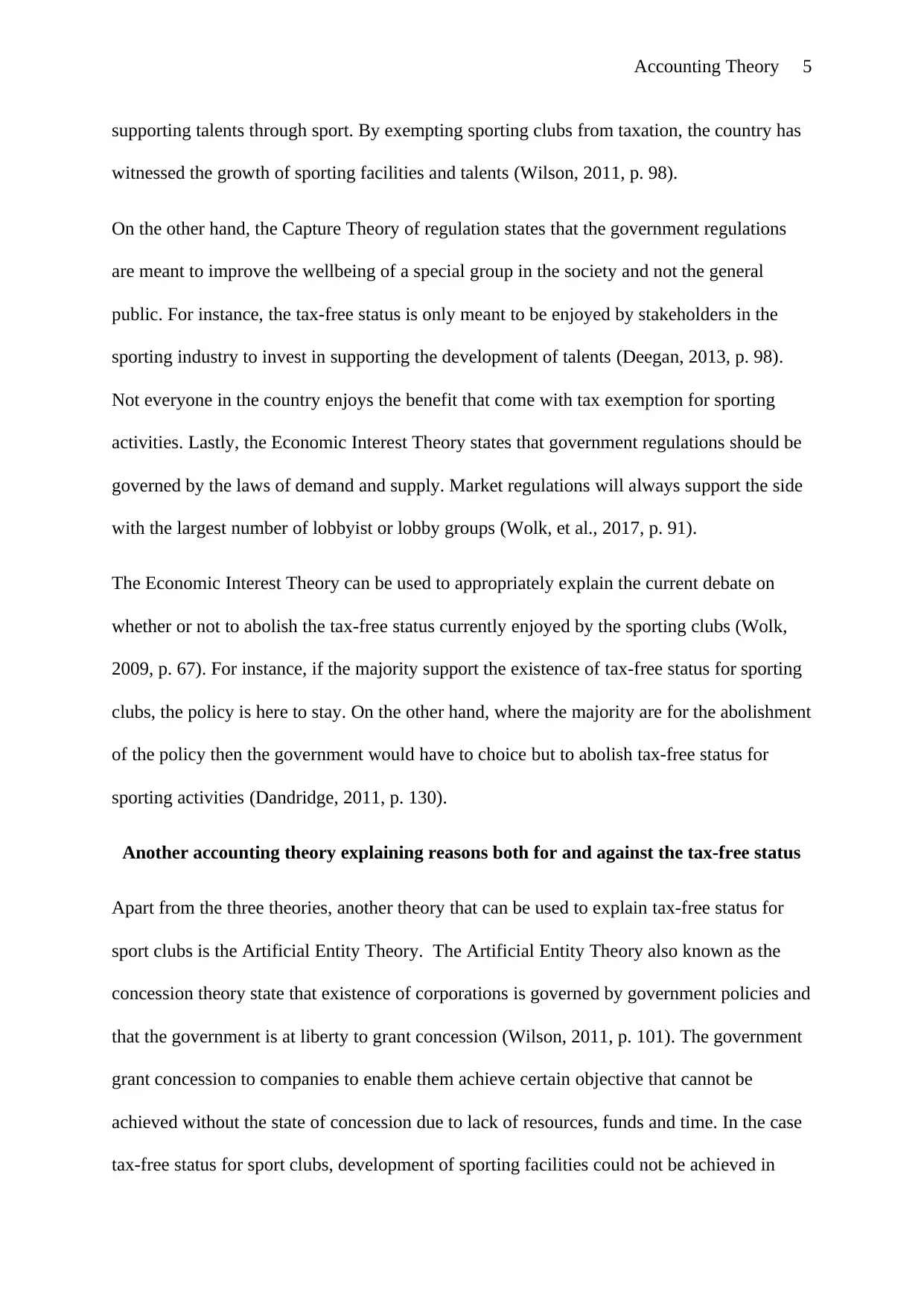
Accounting Theory 5
supporting talents through sport. By exempting sporting clubs from taxation, the country has
witnessed the growth of sporting facilities and talents (Wilson, 2011, p. 98).
On the other hand, the Capture Theory of regulation states that the government regulations
are meant to improve the wellbeing of a special group in the society and not the general
public. For instance, the tax-free status is only meant to be enjoyed by stakeholders in the
sporting industry to invest in supporting the development of talents (Deegan, 2013, p. 98).
Not everyone in the country enjoys the benefit that come with tax exemption for sporting
activities. Lastly, the Economic Interest Theory states that government regulations should be
governed by the laws of demand and supply. Market regulations will always support the side
with the largest number of lobbyist or lobby groups (Wolk, et al., 2017, p. 91).
The Economic Interest Theory can be used to appropriately explain the current debate on
whether or not to abolish the tax-free status currently enjoyed by the sporting clubs (Wolk,
2009, p. 67). For instance, if the majority support the existence of tax-free status for sporting
clubs, the policy is here to stay. On the other hand, where the majority are for the abolishment
of the policy then the government would have to choice but to abolish tax-free status for
sporting activities (Dandridge, 2011, p. 130).
Another accounting theory explaining reasons both for and against the tax-free status
Apart from the three theories, another theory that can be used to explain tax-free status for
sport clubs is the Artificial Entity Theory. The Artificial Entity Theory also known as the
concession theory state that existence of corporations is governed by government policies and
that the government is at liberty to grant concession (Wilson, 2011, p. 101). The government
grant concession to companies to enable them achieve certain objective that cannot be
achieved without the state of concession due to lack of resources, funds and time. In the case
tax-free status for sport clubs, development of sporting facilities could not be achieved in
supporting talents through sport. By exempting sporting clubs from taxation, the country has
witnessed the growth of sporting facilities and talents (Wilson, 2011, p. 98).
On the other hand, the Capture Theory of regulation states that the government regulations
are meant to improve the wellbeing of a special group in the society and not the general
public. For instance, the tax-free status is only meant to be enjoyed by stakeholders in the
sporting industry to invest in supporting the development of talents (Deegan, 2013, p. 98).
Not everyone in the country enjoys the benefit that come with tax exemption for sporting
activities. Lastly, the Economic Interest Theory states that government regulations should be
governed by the laws of demand and supply. Market regulations will always support the side
with the largest number of lobbyist or lobby groups (Wolk, et al., 2017, p. 91).
The Economic Interest Theory can be used to appropriately explain the current debate on
whether or not to abolish the tax-free status currently enjoyed by the sporting clubs (Wolk,
2009, p. 67). For instance, if the majority support the existence of tax-free status for sporting
clubs, the policy is here to stay. On the other hand, where the majority are for the abolishment
of the policy then the government would have to choice but to abolish tax-free status for
sporting activities (Dandridge, 2011, p. 130).
Another accounting theory explaining reasons both for and against the tax-free status
Apart from the three theories, another theory that can be used to explain tax-free status for
sport clubs is the Artificial Entity Theory. The Artificial Entity Theory also known as the
concession theory state that existence of corporations is governed by government policies and
that the government is at liberty to grant concession (Wilson, 2011, p. 101). The government
grant concession to companies to enable them achieve certain objective that cannot be
achieved without the state of concession due to lack of resources, funds and time. In the case
tax-free status for sport clubs, development of sporting facilities could not be achieved in
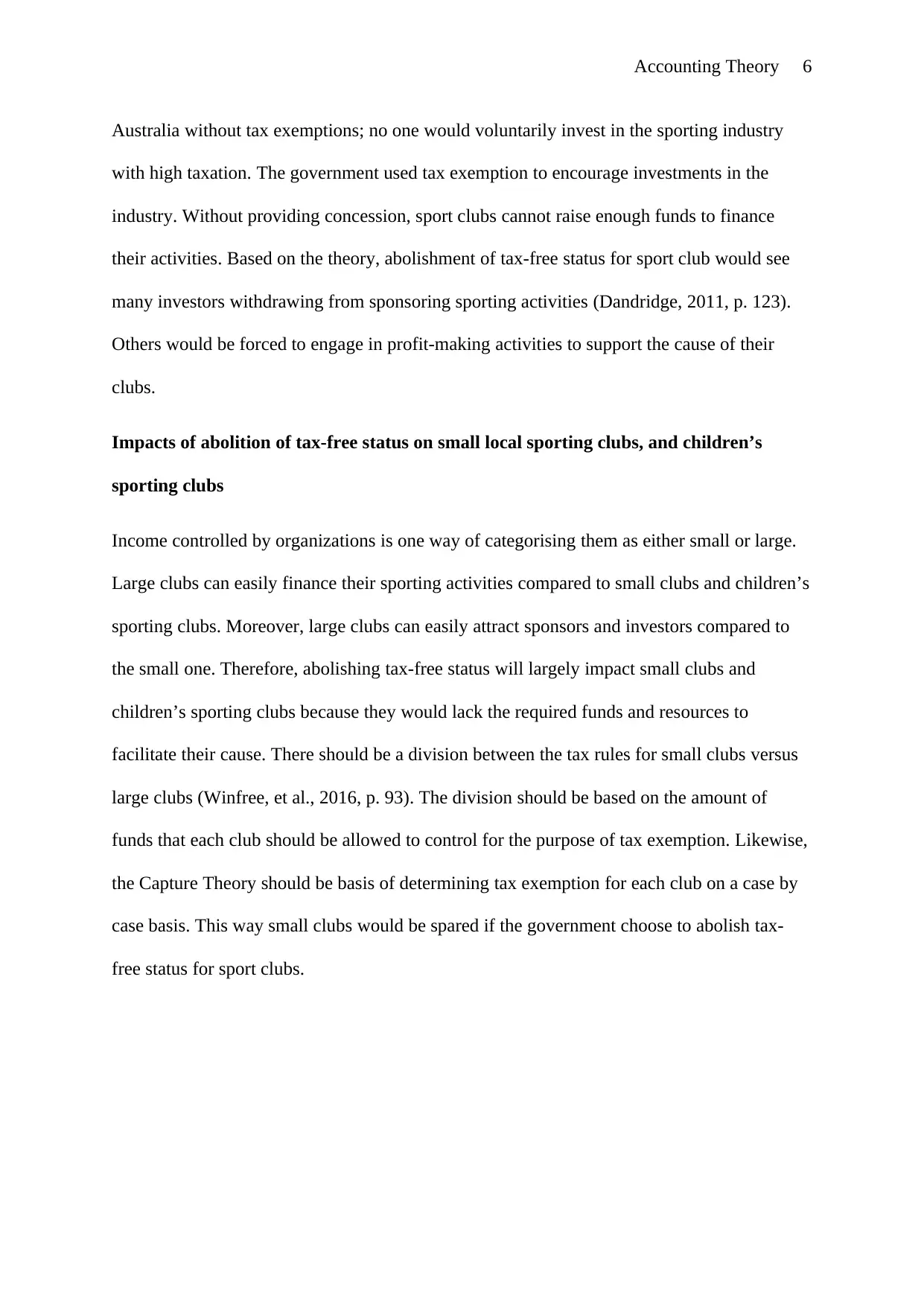
Accounting Theory 6
Australia without tax exemptions; no one would voluntarily invest in the sporting industry
with high taxation. The government used tax exemption to encourage investments in the
industry. Without providing concession, sport clubs cannot raise enough funds to finance
their activities. Based on the theory, abolishment of tax-free status for sport club would see
many investors withdrawing from sponsoring sporting activities (Dandridge, 2011, p. 123).
Others would be forced to engage in profit-making activities to support the cause of their
clubs.
Impacts of abolition of tax-free status on small local sporting clubs, and children’s
sporting clubs
Income controlled by organizations is one way of categorising them as either small or large.
Large clubs can easily finance their sporting activities compared to small clubs and children’s
sporting clubs. Moreover, large clubs can easily attract sponsors and investors compared to
the small one. Therefore, abolishing tax-free status will largely impact small clubs and
children’s sporting clubs because they would lack the required funds and resources to
facilitate their cause. There should be a division between the tax rules for small clubs versus
large clubs (Winfree, et al., 2016, p. 93). The division should be based on the amount of
funds that each club should be allowed to control for the purpose of tax exemption. Likewise,
the Capture Theory should be basis of determining tax exemption for each club on a case by
case basis. This way small clubs would be spared if the government choose to abolish tax-
free status for sport clubs.
Australia without tax exemptions; no one would voluntarily invest in the sporting industry
with high taxation. The government used tax exemption to encourage investments in the
industry. Without providing concession, sport clubs cannot raise enough funds to finance
their activities. Based on the theory, abolishment of tax-free status for sport club would see
many investors withdrawing from sponsoring sporting activities (Dandridge, 2011, p. 123).
Others would be forced to engage in profit-making activities to support the cause of their
clubs.
Impacts of abolition of tax-free status on small local sporting clubs, and children’s
sporting clubs
Income controlled by organizations is one way of categorising them as either small or large.
Large clubs can easily finance their sporting activities compared to small clubs and children’s
sporting clubs. Moreover, large clubs can easily attract sponsors and investors compared to
the small one. Therefore, abolishing tax-free status will largely impact small clubs and
children’s sporting clubs because they would lack the required funds and resources to
facilitate their cause. There should be a division between the tax rules for small clubs versus
large clubs (Winfree, et al., 2016, p. 93). The division should be based on the amount of
funds that each club should be allowed to control for the purpose of tax exemption. Likewise,
the Capture Theory should be basis of determining tax exemption for each club on a case by
case basis. This way small clubs would be spared if the government choose to abolish tax-
free status for sport clubs.
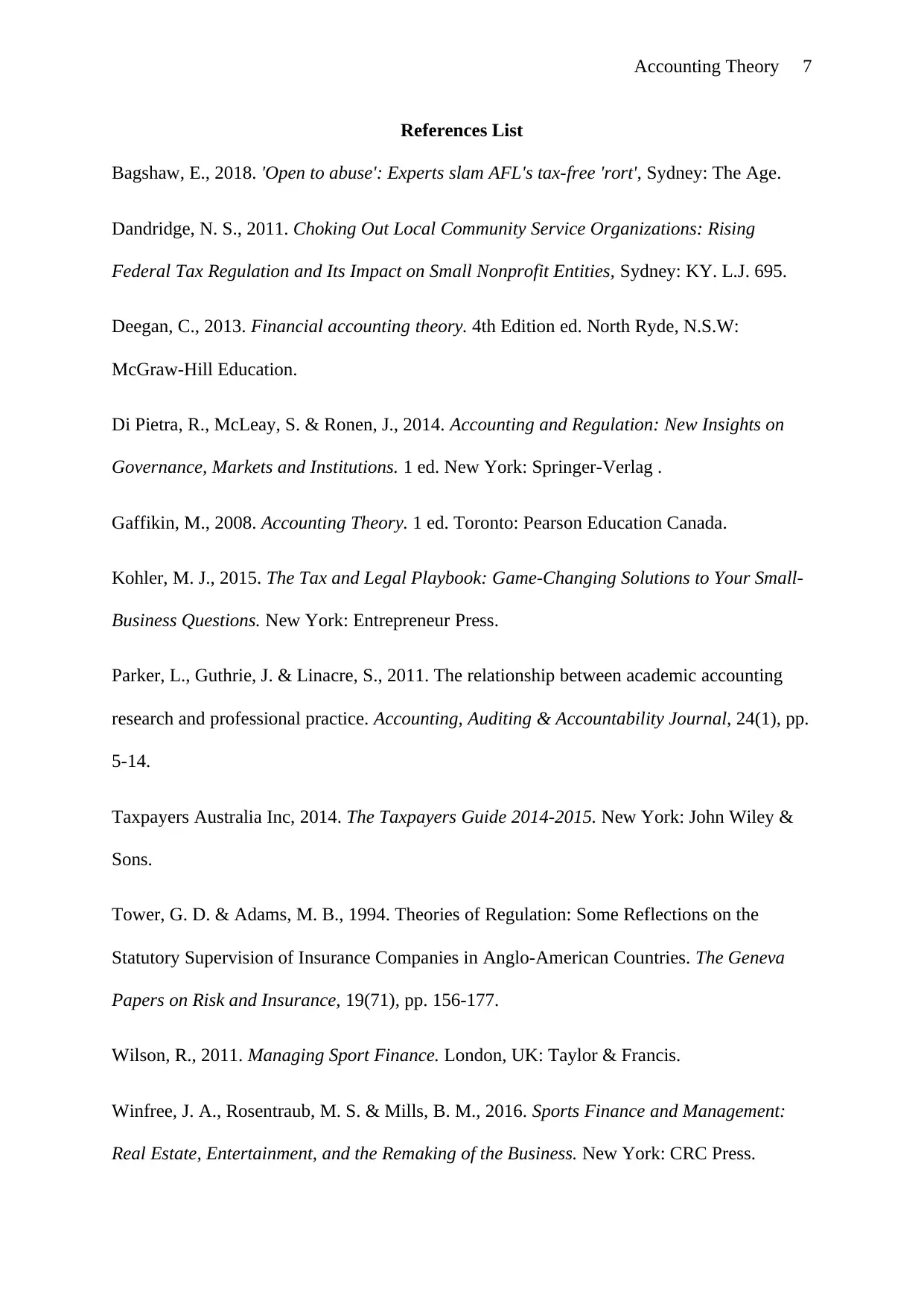
Accounting Theory 7
References List
Bagshaw, E., 2018. 'Open to abuse': Experts slam AFL's tax-free 'rort', Sydney: The Age.
Dandridge, N. S., 2011. Choking Out Local Community Service Organizations: Rising
Federal Tax Regulation and Its Impact on Small Nonprofit Entities, Sydney: KY. L.J. 695.
Deegan, C., 2013. Financial accounting theory. 4th Edition ed. North Ryde, N.S.W:
McGraw-Hill Education.
Di Pietra, R., McLeay, S. & Ronen, J., 2014. Accounting and Regulation: New Insights on
Governance, Markets and Institutions. 1 ed. New York: Springer-Verlag .
Gaffikin, M., 2008. Accounting Theory. 1 ed. Toronto: Pearson Education Canada.
Kohler, M. J., 2015. The Tax and Legal Playbook: Game-Changing Solutions to Your Small-
Business Questions. New York: Entrepreneur Press.
Parker, L., Guthrie, J. & Linacre, S., 2011. The relationship between academic accounting
research and professional practice. Accounting, Auditing & Accountability Journal, 24(1), pp.
5-14.
Taxpayers Australia Inc, 2014. The Taxpayers Guide 2014-2015. New York: John Wiley &
Sons.
Tower, G. D. & Adams, M. B., 1994. Theories of Regulation: Some Reflections on the
Statutory Supervision of Insurance Companies in Anglo-American Countries. The Geneva
Papers on Risk and Insurance, 19(71), pp. 156-177.
Wilson, R., 2011. Managing Sport Finance. London, UK: Taylor & Francis.
Winfree, J. A., Rosentraub, M. S. & Mills, B. M., 2016. Sports Finance and Management:
Real Estate, Entertainment, and the Remaking of the Business. New York: CRC Press.
References List
Bagshaw, E., 2018. 'Open to abuse': Experts slam AFL's tax-free 'rort', Sydney: The Age.
Dandridge, N. S., 2011. Choking Out Local Community Service Organizations: Rising
Federal Tax Regulation and Its Impact on Small Nonprofit Entities, Sydney: KY. L.J. 695.
Deegan, C., 2013. Financial accounting theory. 4th Edition ed. North Ryde, N.S.W:
McGraw-Hill Education.
Di Pietra, R., McLeay, S. & Ronen, J., 2014. Accounting and Regulation: New Insights on
Governance, Markets and Institutions. 1 ed. New York: Springer-Verlag .
Gaffikin, M., 2008. Accounting Theory. 1 ed. Toronto: Pearson Education Canada.
Kohler, M. J., 2015. The Tax and Legal Playbook: Game-Changing Solutions to Your Small-
Business Questions. New York: Entrepreneur Press.
Parker, L., Guthrie, J. & Linacre, S., 2011. The relationship between academic accounting
research and professional practice. Accounting, Auditing & Accountability Journal, 24(1), pp.
5-14.
Taxpayers Australia Inc, 2014. The Taxpayers Guide 2014-2015. New York: John Wiley &
Sons.
Tower, G. D. & Adams, M. B., 1994. Theories of Regulation: Some Reflections on the
Statutory Supervision of Insurance Companies in Anglo-American Countries. The Geneva
Papers on Risk and Insurance, 19(71), pp. 156-177.
Wilson, R., 2011. Managing Sport Finance. London, UK: Taylor & Francis.
Winfree, J. A., Rosentraub, M. S. & Mills, B. M., 2016. Sports Finance and Management:
Real Estate, Entertainment, and the Remaking of the Business. New York: CRC Press.
Paraphrase This Document
Need a fresh take? Get an instant paraphrase of this document with our AI Paraphraser
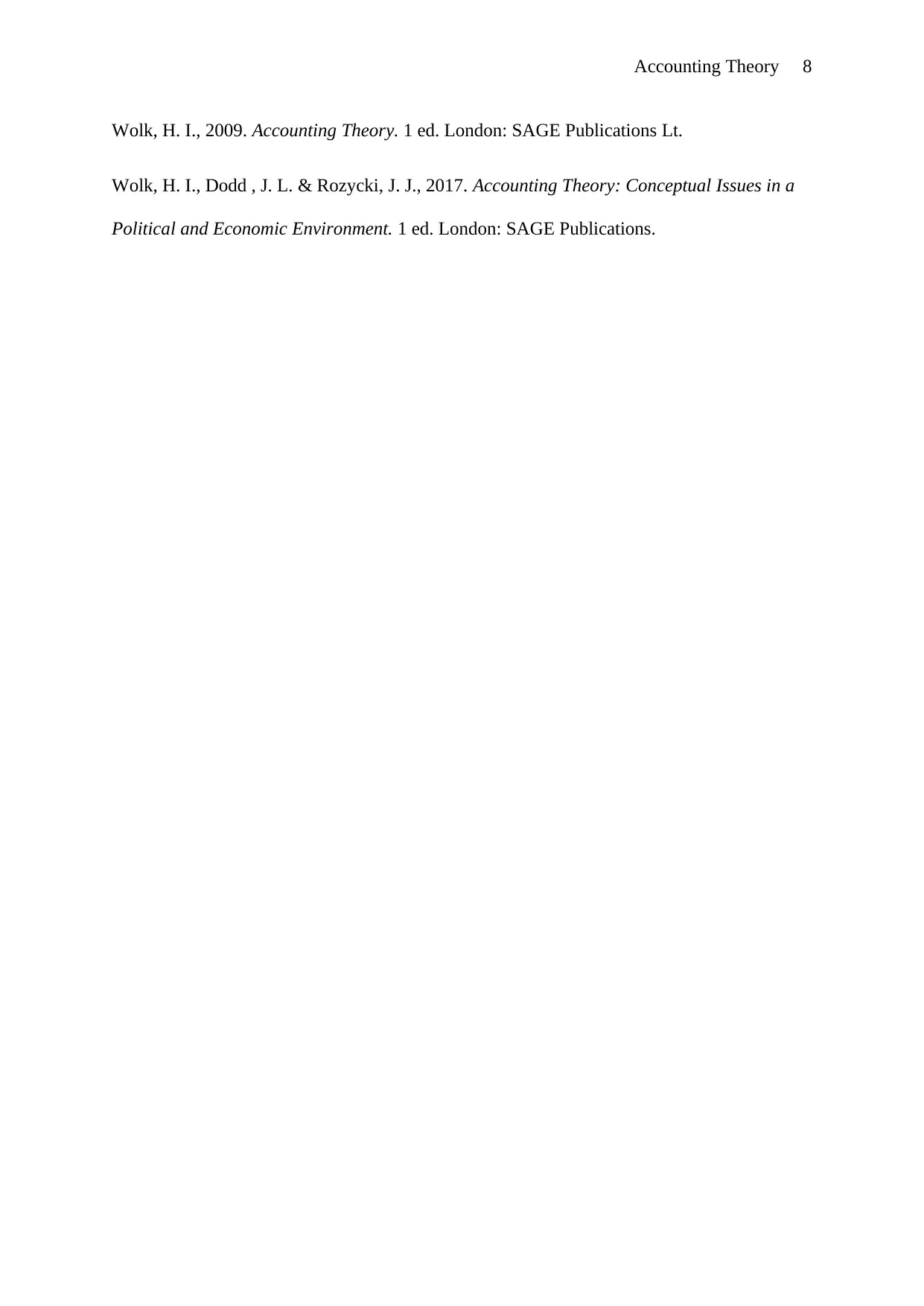
Accounting Theory 8
Wolk, H. I., 2009. Accounting Theory. 1 ed. London: SAGE Publications Lt.
Wolk, H. I., Dodd , J. L. & Rozycki, J. J., 2017. Accounting Theory: Conceptual Issues in a
Political and Economic Environment. 1 ed. London: SAGE Publications.
Wolk, H. I., 2009. Accounting Theory. 1 ed. London: SAGE Publications Lt.
Wolk, H. I., Dodd , J. L. & Rozycki, J. J., 2017. Accounting Theory: Conceptual Issues in a
Political and Economic Environment. 1 ed. London: SAGE Publications.
1 out of 8
Your All-in-One AI-Powered Toolkit for Academic Success.
+13062052269
info@desklib.com
Available 24*7 on WhatsApp / Email
![[object Object]](/_next/static/media/star-bottom.7253800d.svg)
Unlock your academic potential
© 2024 | Zucol Services PVT LTD | All rights reserved.


